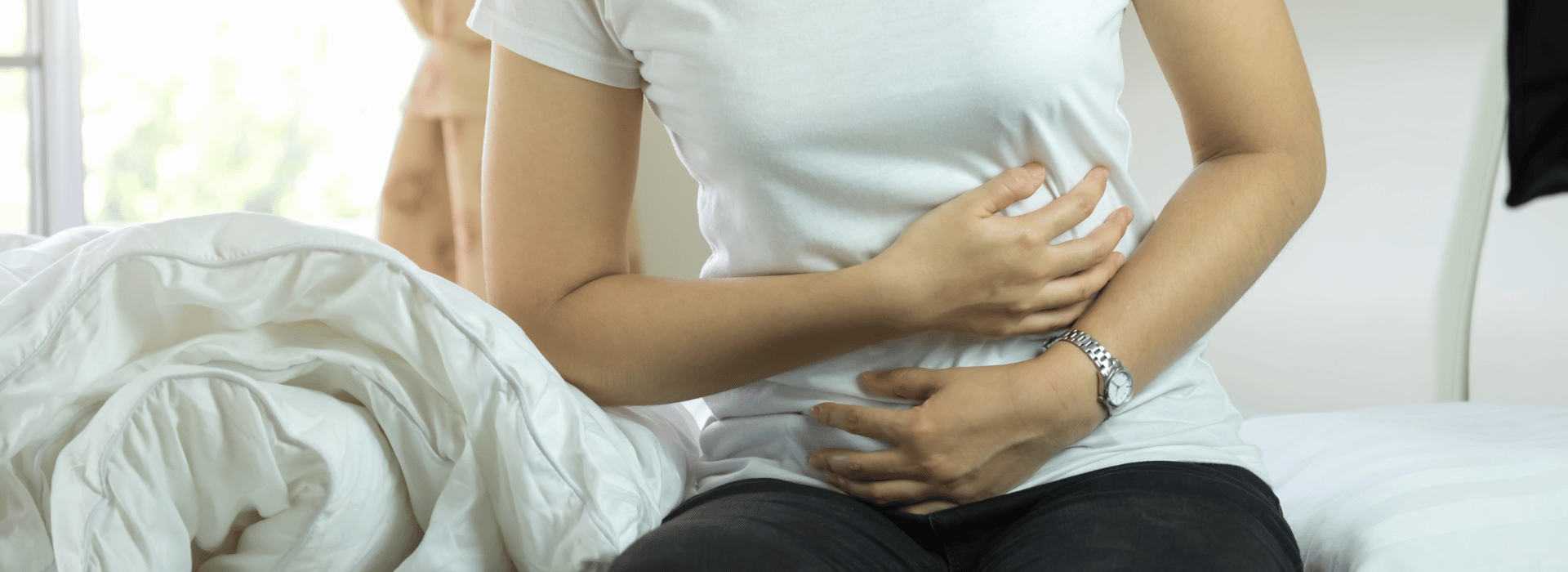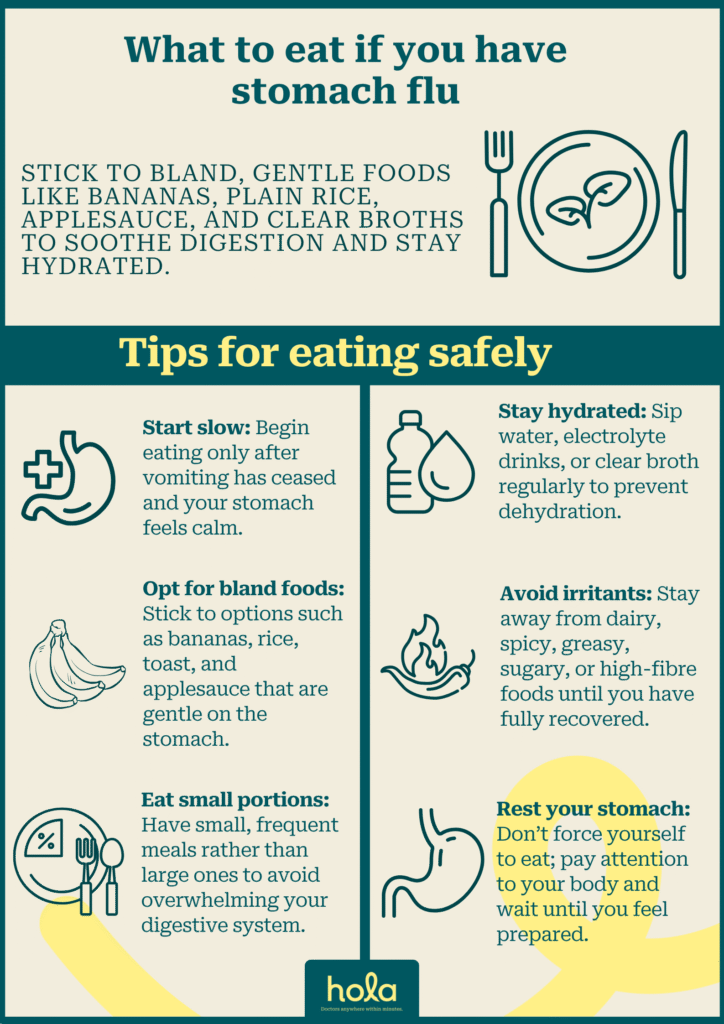What to eat when you have the stomach flu
Written by the editorial staff writer at Hola. Medically Reviewed by Dr. Ammar AL-ANI, MBChB, CCBST, AMC.

Contents

Summary: When dealing with the stomach flu, consume bland, easily digestible foods like bananas, rice, applesauce, toast, and clear broth. These options can help calm your stomach and prevent irritation. Avoid dairy, fatty, spicy, or sugary foods. Start with small servings, stay hydrated, and gradually return to your regular diet as you recover. Eating gently supports healing and reduces discomfort.
Stomach flu, also known as viral gastroenteritis, is a common illness that causes inflammation in the stomach and intestines, leading to nausea, loose stools, vomiting, abdominal pain, and sometimes fever. In Australia, it’s estimated that there are approximately 17.2 million cases of gastroenteritis each year. During this time, the digestive system becomes very sensitive and eating inappropriate foods may aggravate symptoms or delay recovery. Hence, knowing what to eat during stomach flu is important to calm the digestive tract, maintain hydration, and promote healing.
What is the stomach flu?
The stomach flu, also referred to as viral gastroenteritis, is an illness that leads to inflammation in the stomach and intestines. It is typically caused by viruses such as norovirus or rotavirus and can be spread through tainted food, water, or contact with infected individuals. Common signs include nausea, vomiting, diarrhoea, abdominal cramps, and occasionally fever or body aches. Despite being called “flu,” it is not related to influenza.
Also read: How Long is Stomach Flu Contagious?
What to eat if you have the stomach flu
If you're experiencing the stomach flu, opt for bland, easily digestible foods to avoid further irritating your stomach. Begin with small portions of foods like:
- Bananas are gentle on the stomach and rich in potassium
- Plain white rice can help firm stools
- Applesauce offers pectin, which is soothing for digestion
- Clear broths aid in hydration while providing some nutrients
Avoid dairy, fatty, spicy, or sugary foods. Focus on hydration with water, electrolyte drinks, or oral rehydration solutions. Once you start to feel better, gradually reintroduce your normal diet.
Feeling sick and unsure why? Speak with a GP online in 15 minutes.
Foods to avoid during the stomach flu
During the stomach flu, avoid consuming foods that could irritate your digestive system or exacerbate symptoms. These include:- Dairy products like milk, cheese, and ice cream, which can be difficult to digest
- Greasy or fried foods that could upset your stomach
- Spicy dishes that might irritate the gut lining
- Caffeinated beverages like coffee, tea, or energy drinks can lead to dehydration
- Sugary foods and drinks might worsen diarrhoea
- High-fibre foods such as raw vegetables, legumes, and whole grains, which can be too harsh on your stomach during this period
- Alcohol, which can irritate the stomach and promote dehydration
Also read: Best foods to eat after norovirus: What to eat & avoid while recovering
How long should you follow a recovery diet after stomach flu?
You should maintain a recovery diet for approximately 2 to 3 days following the stomach flu, or until your digestive system feels completely normal. Start with bland, low-fat, and easily digestible options like toast, rice, bananas, and applesauce. Gradually reintroduce more complex foods as your appetite increases and symptoms improve. If nausea, diarrhoea, or abdominal pain recur, continue bland foods and stay hydrated.
Tips for eating safely during the stomach flu
Here are several guidelines for eating safely during the stomach flu to support recovery and minimise irritation:
- Start slow: Begin eating only after vomiting has ceased and your stomach feels calm.
- Opt for bland foods: Stick to options such as bananas, rice, toast, and applesauce that are gentle on the stomach.
- Eat small portions: Have small, frequent meals rather than large ones to avoid overwhelming your digestive system.
- Stay hydrated: Sip water, electrolyte drinks, or clear broth regularly to prevent dehydration.
- Avoid irritants: Stay away from dairy, spicy, greasy, sugary, or high-fibre foods until you have fully recovered.
- Rest your stomach: Don’t force yourself to eat; pay attention to your body and wait until you feel prepared.
These suggestions can assist your body in recovering and lower the chances of further discomfort.

When to consult a doctor for stomach flu
You should reach out to a doctor for stomach flu if your symptoms persist beyond three days, or if you're unable to hold down any fluids for more than 24 hours. Seek medical attention if you exhibit signs of dehydration, such as a dry mouth, dizziness, dark urine, or scant urination. Other warning indicators include a high fever (over 101°F or 38.3°C), blood in vomit or stool, or intense abdominal pain. Infants, young children, older adults, and individuals with weakened immune systems are at greater risk and should consult a GP sooner if symptoms are severe or not improving. Prompt medical attention can help avert complications and ensure effective treatment.
Conclusion:
In conclusion, eating simple, easy-to-digest foods and staying well-hydrated can help ease stomach flu symptoms and promote healing. Avoid heavy, spicy, fatty, or dairy foods until you feel better.
FAQs
What should I eat if I have the stomach flu?
If you have stomach flu, eat bland, easily digestible foods like bananas, toast, white rice, applesauce, and clear liquids like water or broth. Avoid dairy, spicy, fatty, and sugary foods.
Is it safe to eat when you have the stomach flu?
Yes, it is safe to eat during a bout of stomach flu, but it’s best to start with small amounts of bland, easily digestible foods once vomiting stops. Focus on hydration and gradually reintroduce gentle foods such as bananas, applesauce, rice, and toast.
What drinks help during stomach flu recovery?
During stomach flu recovery, helpful drinks include:
- Water
- Clear broths
- Herbal teas
- Electrolyte drinks
- Oral rehydration solutions (ORS)
Should I eat solid food during the stomach flu?
It’s best to wait until vomiting has subsided and you can keep liquids down before introducing solid foods. Begin with bland, easy-to-digest foods like the BRAT diet (bananas, rice, applesauce, toast). Gradually expand the range of solid foods as your stomach tolerates them. Avoid greasy, fatty, or spicy foods until fully recovered.
Can kids follow the same stomach flu eating guidelines?
Yes, children can follow similar stomach flu eating guidelines, but with a few adjustments. Begin by giving clear liquids such as water, diluted electrolyte solutions, or broth to keep them hydrated. Once vomiting stops, you can introduce mild foods like the BRAT diet (bananas, rice, applesauce, toast). For younger children, smaller, more frequent meals may be easier to tolerate. Always avoid dairy, sugary, or fatty foods until they have fully recovered. If symptoms persist or worsen, consult a paediatrician.
How long should I stick to a bland diet after stomach flu?
You should follow a bland diet for about 1-2 days after stomach flu symptoms subside. Once you can tolerate bland foods without discomfort, you can gradually start reintroducing more regular foods. If you still have nausea or stomach discomfort, continue the bland diet until you feel better. Always listen to your body and avoid rushing back to regular eating too quickly.
Need time off to recover? Get your medical certificate online within 15 minutes.
What we treat
- Cough
- Nausea & vomiting
- Fever
- Hayfever
- Fatigue
- Sore throat
- Acne
- Hair loss
- Gout
- Eczema
- Rosacea
- Sunburn
- UTI
- Erectile dysfunction
- Contraception
- Morning sickness
- Morning after pill
- Prostate health
- Anxiety
- Depression
- Stress
- Grief & loss
- Antidepressants
- Premature ejaculation
- Asthma
- Blood pressure
- Blood thinners
- Diabetes
- Cholesterol
- Migraines & headaches
- Allergies
- Body ache
- Heartburn & reflux
- Sleep disorder
- Pain relief
- Gastro
Related Articles
[the-post-grid id="43853" title="Stomach Bugs Single"]Disclaimer
This blog is for general informational purposes only and does not indicate that Hola Health provides all treatments or preventive measures mentioned. It is not intended to be a substitute for professional medical advice. Always seek the guidance of your doctor or other qualified health professional with any questions you may have regarding your health or a medical condition. For emergencies please immediately contact 000. Any medical topics discussed are intended to educate, not to imply availability through Hola Health.


 Facebook
Facebook  X
X  Copy Link
Copy Link
